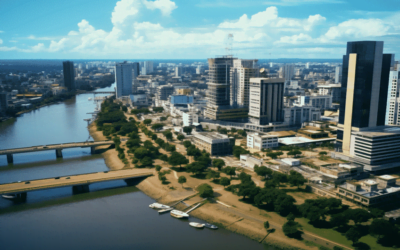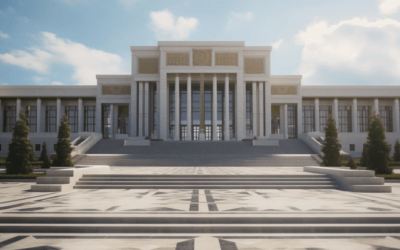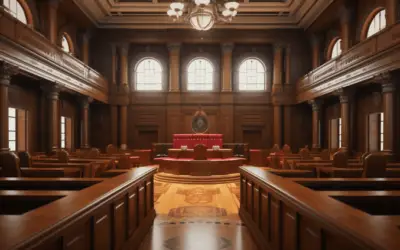Hey there, fellow drone enthusiasts and curious minds! If you’re reading this, chances are you’ve got some burning questions about the drone laws in the Republic of the Congo.
I understand the curiosity and the need for clarity when it comes to navigating the skies with your trusty drone. Whether you’re a hobbyist, a professional operator, or just someone who’s intrigued by the world of unmanned aerial systems, it’s crucial to know the rules, right? Well, you’re in the right place.
You see, I’ve delved deep into the realm of the Republic of the Congo Drone Laws. Through meticulous research and studying the regulations in place, I’ve got the answers you’re seeking.
I’ve combed through the available information and gained insights into the current state of drone regulations in this captivating corner of Central Africa. The aim? To provide you with the most up-to-date and comprehensive guide to drone laws in the Republic of the Congo.
So, if you’re looking for clarity, guidance, and practical knowledge regarding drone operations in the Republic of the Congo, you’ve come to the right place.
In this article, I’m going to break it all down for you, demystify the regulations, and help you understand the dos and don’ts of drone flying in this beautiful country.
Whether you’re a visitor, a local, or a government operator, you’ll find valuable information to ensure you’re flying safely and within the bounds of the law. So, read on, and let’s unravel the fascinating world of the Republic of Congo Drone Laws together.
Regulatory Authority and Overview

So, let’s embark on our journey through the maze of the Republic of Congo Drone Laws. You know, when it comes to flying drones in any country, understanding who’s in charge and the lay of the land is the first step.
In the Republic of the Congo, that falls under the watchful eye of the Agence Nationale de l’Aviation Civile, or ANAC for short. They’re the ones responsible for keeping the skies in check.
Regulatory Authority
ANAC—it’s not just an acronym; it’s the hub of authority when it comes to drone regulations in the Republic of the Congo. So, who exactly are they? Well, ANAC stands for Agence Nationale de l’Aviation Civile du Congo, and they are the go-to body for all things aviation in this beautiful country. Whether it’s managing commercial flights, ensuring air safety, or yes, you guessed it, drone operations, they’ve got it covered.
ANAC plays a pivotal role in setting the standards, ensuring safety, and overseeing the drone activities in the Republic of the Congo.
While many drone enthusiasts might find it surprising, this regulatory authority keeps a keen eye on the skies, making sure that every drone operation is in line with the laid-out regulations. They’re the guiding hand that keeps the drone community flying safely and responsibly in the Congolese skies.
Explanation of the Absence of Codified Drone Regulations
You might be wondering, “Okay, ANAC is the authority, but what about the rules and regulations?” Well, here’s where it gets intriguing.
As of my last update in September 2021, the Republic of the Congo had not carved its drone regulations into stone, so to speak. In other words, there weren’t detailed, codified laws specifically dedicated to drone operations.
This is where it gets interesting. While there weren’t comprehensive drone regulations unique to the Republic of the Congo, it doesn’t mean it’s a free-for-all in the skies.
So, how does one operate a drone responsibly when the rules aren’t spelled out? In our case, the answer lies in turning to international guidelines and recommendations set forth by the International Civil Aviation Organization (ICAO).
It’s a bit like sailing in uncharted waters but with a trusty compass in hand. The ICAO’s guidelines serve as a North Star, guiding drone operators in the absence of local regulations, and ensuring safe and responsible flights.
In our subsequent journey through the Congo’s drone laws, we’ll delve into these international recommendations and more to help you navigate the drone scene with confidence.
Also Read: Drone Laws in Chad 2024
Drone Laws for Hobbyist Operators

Now, let’s dive into the world of hobbyist drone operators in the Republic of the Congo. You know, those folks who love capturing breathtaking aerial shots, exploring the skies for the sheer joy of it, and maybe even competing in impromptu drone races. It’s an exciting world, but as we’ll discover, there’s an air of uncertainty and an absence of clear-cut regulations.
Overview of Regulations for Hobbyist Drone Operators
Hobbyist drone operators, the ones who fly drones purely for fun, might expect a straightforward set of rules. However, in the Republic of the Congo, it’s not quite that simple. The regulations for hobbyists are still in a state of uncertainty, as of my last update in September 2021. This means that there aren’t clear, formal guidelines to govern hobbyist drone operations.
But worry not, because I’m here to shed some light on how you can navigate the hobbyist drone world responsibly despite the lack of detailed regulations.
Uncertainty in Hobbyist Drone Flights
Picture this: you’ve got your drone ready, the sun is shining, and you’re eager to capture some stunning aerial footage. But the looming question is, what are the exact rules you need to follow? That’s the uncertainty hobbyist drone operators face in the Republic of the Congo.
Unlike many countries with well-defined rules for recreational drone flights, Congo has yet to establish clear regulations dedicated to hobbyists.
This means that when you’re out there enjoying your drone, you’re in somewhat uncharted territory. So, the key here is to err on the side of caution and follow general safety guidelines to ensure you’re flying responsibly.
The Inapplicability of a Hobbyist Congo Drone Pilot License
Here’s where it gets interesting. In many places, you’d need a specific pilot license, even for recreational drone flights. However, in the Republic of the Congo, as of my last update, there’s no requirement for hobbyist drone operators to obtain a separate drone pilot license.
That means you don’t need to go through the process of obtaining a license like a commercial pilot would. It’s a unique aspect of drone laws here, and it means hobbyists can take to the skies more easily.
The Inapplicability of Drone Registration for Hobbyists
Now, let’s talk about the nitty-gritty of drone registration. In some countries, hobbyist drone operators are required to register their drones.
This helps authorities keep track of the drone population. But in the Republic of the Congo, a formal requirement is absent for hobbyists to register their drones.
It might be a relief for hobbyists, as it simplifies the process of getting into the world of drone flying without dealing with bureaucratic red tape.
The Inapplicability of Drone Remote ID for Hobbyists
Drone Remote ID is a technology that allows authorities to track and identify drones during flight. In many places, its implementation is mandatory. However, for hobbyist drone operators in the Republic of the Congo, the use of Remote ID is not applicable. This means you can enjoy your flights without the need for this tracking technology.
Uncertainty Regarding Drone Insurance for Hobbyist Drone Operations
Insurance is like a safety net for many drone operators, giving them peace of mind in case of accidents or mishaps. But when it comes to hobbyist drone operators in the Republic of the Congo, the situation is a bit uncertain.
As of my last update, there’s no specific requirement for hobbyists to carry liability insurance for their drone activities.
While insurance can be a good idea to protect against unexpected situations, the absence of this requirement means hobbyists might have some flexibility in this regard. It’s a double-edged sword, offering less bureaucracy but also emphasizing the importance of flying your drone safely.
Also Read: Drone Laws in Central African Republic 2024
Drone Laws for Commercial Operators

Now, let’s venture into the world of commercial drone operators in the Republic of the Congo. These are the individuals and businesses that employ drones for various professional purposes, from aerial photography to inspections and surveys.
However, as we’ll uncover, the landscape for commercial drone operations in the Congo is somewhat enigmatic.
Overview of Regulations for Commercial Drone Operators
When it comes to operating drones for commercial purposes in the Republic of the Congo, there’s a cloud of uncertainty hovering overhead.
As of my last update in September 2021, the drone regulations for commercial operators aren’t as clear-cut as one might expect.
Unlike many countries that have well-defined rules for commercial drone operations, the Congo lacks specific regulations tailored for this category. This doesn’t mean it’s a free-for-all, but it does necessitate a prudent approach for anyone looking to employ drones for business purposes.
Uncertainty in Commercial Drone Flights
Picture this scenario: you’re a business owner, eager to employ drones for aerial surveys or capturing stunning visuals for your clients.
But here’s the rub – what exactly are the regulations you need to adhere to? Well, in the Congo, the landscape for commercial drone flights is marked by uncertainty.
The lack of detailed regulations for commercial drone operations can be both a boon and a challenge. On one hand, it offers flexibility, but on the other, it calls for a responsible and cautious approach.
The Inapplicability of a Commercial Congo Drone Pilot License
In many countries, commercial drone operators are required to obtain a specific drone pilot license. It’s a stringent process that ensures they’re well-trained and knowledgeable.
But in the Republic of the Congo, as of my last update, there’s no requirement for commercial drone operators to obtain a separate pilot license.
This unique aspect of drone laws streamlines the process for businesses, making it relatively easier to get started with commercial drone operations.
The Inapplicability of Drone Registration for Commercial Operators
In some parts of the world, commercial drone operators are obliged to register their drones. This aids in maintaining a record of the drone population and the operators using them.
In the Congo, however, there’s no formal requirement for commercial operators to register their drones. This might come as a relief for businesses looking to utilize drones without the additional bureaucratic hurdles.
The Inapplicability of Drone Remote ID for Commercial Operators
Drone Remote ID, a technology that enables the tracking and identification of drones during flight, is a requisite in many regions. However, for commercial drone operators in the Republic of the Congo, the use of Remote ID is not applicable. This means you can conduct your commercial drone operations without the need for this tracking technology.
Uncertainty Regarding Drone Insurance for Commercial Drone Operations
Insurance often acts as a safety net for businesses employing drones, protecting in case of mishaps or accidents.
But in the Congo, as of my last update, there’s no specific requirement for commercial drone operators to carry liability insurance for their drone activities.
While insurance is a wise consideration, the absence of this requirement offers a degree of flexibility for businesses. However, it also underscores the importance of conducting commercial drone operations safely and responsibly.
Also Read: Drone Laws in Canada 2024
Drone Laws for Visitors and Tourists

Let’s now uncover what drone laws have in store for those who are simply passing through or exploring the beauty of the Republic of the Congo.
Whether you’re a foreign visitor or a tourist eager to capture the stunning landscapes from above, it’s essential to understand the regulations governing drone flights during your stay.
Regulations for Foreign Visitors or Tourists Interested in Drone Operations
As a foreign visitor or tourist with a drone in tow, it’s important to be aware of the Republic of the Congo’s stance on drone operations.
However, as of my last update in September 2021, the regulations for tourists interested in drone flights are somewhat undefined. This means that you might need to exercise extra caution and stay informed about the drone guidelines that apply during your stay.
Restrictions on Foreign Visitor Drone Flights
Imagine you’ve arrived in the Republic of the Congo, your drone ready for exciting adventures. But, you might be wondering, are there any restrictions for foreign visitors and tourists who want to take their drones to the skies? Well, the situation in Congo is a bit ambiguous in this regard.
There aren’t explicit regulations that detail the restrictions for drone flights by tourists. However, it’s crucial to remember that even in the absence of stringent rules, flying responsibly and with safety in mind is always a good practice.
The Inapplicability of a Foreign Visitor Drone Pilot License
In many countries, foreign visitors are required to obtain a specific drone pilot license if they wish to fly drones during their stay.
But in the Republic of the Congo, as of my last update, there’s no requirement for foreign visitors or tourists to obtain a separate drone pilot license. This means you won’t have to go through the process of obtaining a local license if you’re planning to use your drone during your visit.
The Inapplicability of Drone Registration for Tourists
When it comes to drone registration, you might expect that as a foreign visitor or tourist, you’d have to complete paperwork and register your drone.
Surprisingly, there’s no formal requirement for tourists to register their drones in the Congo. This eases the process of bringing and using your drone during your visit, as you won’t need to navigate the registration process.
The Inapplicability of Drone Remote ID for Tourists
Drone Remote ID, a technology that facilitates tracking and identification of drones during flight, is mandatory in many regions.
However, in the Republic of the Congo, the use of Remote ID is not applicable for tourists. This means you can enjoy your drone flights without the need for this tracking technology.
The Inapplicability of Drone Insurance for Tourist Drone Operations
Insurance can offer peace of mind for drone operators, including tourists, by providing coverage in case of accidents. However, as of my last update, there’s no specific requirement for tourists to carry liability insurance for their drone activities in the Republic of the Congo.
While insurance is a wise consideration, the absence of this requirement provides some flexibility for tourists. Nonetheless, it emphasizes the importance of conducting drone operations safely and responsibly during your visit.
Also Read: Drone Laws in Cameroon 2024
Government Drone Operations

Now, let’s delve into the world of government drone operations in the Republic of the Congo. While we’ve explored the regulations for hobbyists, commercial operators, and tourists, the rules change slightly when it comes to government drone activities.
Let’s uncover the unique aspects of government drone operations.
Regulations Specific to Government Drone Operators
Government drone operators have their own set of rules in the Republic of the Congo. As of my last update in September 2021, the regulations governing government drone operations are somewhat unique and distinct from those that apply to other categories of drone users.
So, if you’re part of a government agency looking to deploy drones for various purposes, there are specific guidelines you need to be aware of.
Government Drone Flights Are Allowed in the Congo
Here’s the good news for government agencies – drone flights are indeed allowed in the Republic of the Congo.
This means that government entities have the green light to use drones for various applications, such as surveillance, environmental monitoring, or emergency response. The Congolese government recognizes the potential of drones and permits their use.
The Inapplicability of a Government Drone Pilot License
In many countries, government drone operators are required to obtain a specific pilot license for their drone pilots.
This ensures that the operators are well-trained and capable of conducting safe drone flights. However, in the Republic of the Congo, as of my last update, there’s no requirement for government drone operators to obtain a separate pilot license. This simplifies the process for government agencies to deploy drones.
Drone Registration Required for Government Operations
While tourists and hobbyists may not need to register their drones, government operations follow a different path. Government agencies are required to register their drones for official use. This registration process helps in tracking and monitoring government-owned drones.
It’s a way to ensure accountability and responsibility in the use of these unmanned aerial systems.
The Inapplicability of Drone Remote ID for Government Operations
In many regions, including government drone flights, the use of Drone Remote ID is mandatory. However, in the Republic of the Congo, the use of Remote ID is not applicable for government operations.
This eases the regulatory burden for government agencies when it comes to tracking and identification technologies.
The Inapplicability of Drone Insurance for Government Drone Operations
Government drone operations often require insurance coverage to safeguard against unexpected incidents.
However, as of my last update, there’s no specific requirement for government agencies to carry liability insurance for their drone activities in the Republic of the Congo.
While insurance is a prudent choice, the absence of this requirement streamlines the process for government drone deployments. Nonetheless, it underscores the importance of conducting government drone operations with safety in mind.
Also Read: Drone Laws in Cambodia 2024
ICAO Recommendations

You might be wondering, “Why is the International Civil Aviation Organization (ICAO) such a big deal when it comes to drone regulations in the Republic of the Congo?” Well, that’s a great question. In this section, we’ll dive into the significance of ICAO and why their recommendations matter in the absence of codified drone regulations.
Role and Significance of the International Civil Aviation Organization (ICAO)
The International Civil Aviation Organization, or ICAO for short, plays a pivotal role in the world of aviation. Think of it as the guiding star that helps maintain order and safety in the skies.
ICAO is a specialized agency under the United Nations, dedicated to overseeing and standardizing civil aviation across the globe. Its mission is to ensure that the skies are a safe and organized place for all.
When it comes to drones, ICAO serves as a key influencer in shaping guidelines and standards, even in regions where local regulations may be lacking.
ICAO Provides Standardized Guidelines and Regulations for Member States
ICAO isn’t just a talk shop; it provides tangible benefits for its member states. These are the countries that have signed up for the Chicago Convention, which established ICAO back in 1944.
ICAO acts as a central body that offers standardized guidelines, practices, and regulations that its member states can adopt and implement.
So, when a country like the Republic of the Congo lacks specific drone regulations, it can turn to ICAO for guidance, ensuring that drone operations align with international safety standards.
The Adoption of ICAO Model UAS Regulations and Circulars by Member States
ICAO doesn’t just issue guidelines; it provides model regulations and circulars that member states can choose to adopt. These models offer a structured framework for the safe operation of unmanned aircraft systems (UAS), which includes drones.
When a country, such as the Republic of the Congo, looks to fill the regulatory gap in the drone space, it can lean on ICAO’s Model UAS regulations as a foundation.
This makes it easier for member states to craft their own drone regulations that are both safe and in line with international standards. So, even in places where drone laws are somewhat in limbo, ICAO’s guidance ensures that the skies remain safe and well-ordered.
Also Read: Drone Laws in Cape Verde 2024
Final Thoughts on The Republic of the Congo Drone Laws

As we draw the curtains on our exploration of drone laws in the Republic of the Congo, it’s essential to revisit the key takeaways and underscore the importance of staying in the know. Regulations, like the winds, can change, and being informed is your best tool to navigate the skies safely.
Throughout our journey, we’ve uncovered the intricate web of drone laws in the Congo. From hobbyist drone operations to commercial ventures, from tourism to government activities, the landscape is marked by distinct rules and sometimes intriguing gaps in regulations.
We’ve learned that the Republic of the Congo lacks specific, codified drone regulations, making adherence to international guidelines, like those provided by ICAO, paramount.
Drone regulations, much like technology, are ever-evolving. What’s true today may not be so tomorrow. Therefore, it’s vital to stay updated with the latest developments in drone laws in the Congo.
The absence of codified regulations in some categories underscores the need for vigilance. As a drone enthusiast, it’s your responsibility to keep your finger on the pulse of changes that might occur in the regulatory landscape.
In parting, whether you’re a hobbyist, a commercial operator, a tourist, or government personnel, the same message holds: prioritize safety.
While the absence of specific regulations can offer flexibility, it also places the onus on operators to act responsibly and with safety in mind. The sky is vast and full of possibilities, but it’s a space we all share.
Let’s ensure that our drone operations are not just about capturing breathtaking moments but doing so with the utmost responsibility, care, and respect for the regulations and the people who share our airspace. Fly safely, Congo drone enthusiasts!













